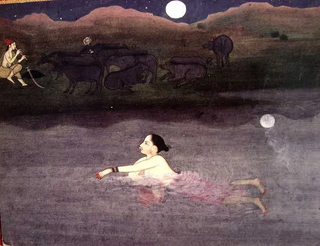
Heer Ranjha is one of the four popular tragic romances of the Punjab. The other three are Mirza Sahiban, Sohni Mahiwal and Sassi Punnun. There are several poetic narrations of the story; the most famous being Heer by Waris Shah written in 1766. It tells the story of the love between Heer Sial and Dheedo Ranjha.

Pakistani folklore encompasses the mythology, poetry, songs, dances and puppetry from Pakistan's various ethnic groups.

Kuldeep Manak, also spelled as Kuldip Manak, was an Indian singer best known for singing a rare genre of Punjabi music, kali, also known by its plural form kalian or kaliyan. Manak is generally regarded as one of the greatest Punjabi artists of all time. His high pitched strong voice was unique, and instantly recognisable. A statue of Manak has been erected in Ludhiana near his residence as a tribute.

Mirza Sahiban is one of the four popular tragic romances of the Punjab. The other three are Heer Ranjha, Sohni Mahiwal and Sassi Punnun.
Jugni is an age-old narrative device used in Punjabi folk music. It is the traditional music of the Punjab region of the Indian subcontinent.

Sohni Mahiwal or Suhni Mehar is one of the seven popular tragic romances of Sindh. The other six are Umar Marvi, Momal Rano, Sassui Punnhun, Lilan Chanesar, Sorath Rai Diyach, and Noori Jam Tamachi. In Punjab, it is four of the most popular romances. The other three are Heer Ranjha, Sassui Punnhun and Mirza Sahiban.
Arif Lohar(born 18 April 1966) is a Pakistani Punjabi folk singer. He became popular in Pakistan as well as in India after his famous song "Jugni" with Nooran Lal in 2006. He usually sings accompanied by a native musical instrument resembling tongs. His folk music is representative of the traditional folk heritage of Punjab. He is the son of the renowned folk singer Alam Lohar.

A Punjabi Qissa is a tradition of Punjabi language oral story-telling that emerged in Punjab region of eastern Pakistan and northwestern India, with the fusion of local Punjabi people and migrants from the Arabian peninsula and contemporary Iran.

Alam Lohar was a prominent Pakistani Punjabi folk music singer. He is credited with creating and popularising the musical term Jugni.
Bikram Singh is an American bhangra music artist. A graduate of Touro Law School, he also works as an attorney in New York City.
Punjabi folklore, more particularly its folksongs, are a core part of the Punjabi culture. Other important components of Punjabi folklore are farces, anecdotes, idioms, folktales, and sayings.
Paramjit Singh Sidhu, professionally known as Pami Bai, is an Indian singer, songwriter and Bhangra dancer from Patiala.

Husn Lal and Bhagat Ram were the first legendary music directors duo in Bollywood. They are two brothers, Husn Lal and Bhagat Ram.

Master Saleem also known as Saleem Shahzada is an Indian singer who is known for his work as a devotional singer and also as a playback singer in Bollywood films, like Heyy Babyy (2007), Dostana and Love Aaj Kal (2009). He has also released several private albums of Punjabi Music and Sufi music.
Lakhwinder Wadali is an Indian musician and singer, who hails from a family of musicians from Punjab, India. His grandfather Thakur Dass Wadali was a renowned vocalist and his father and uncle formed a Sufi qawwali duo, the Wadali brothers. Lakhwinder received extensive training and guidance in classical music from his father Puran Chand Wadali. His songs blend classical and current trends in music. His repertoire includes renditions of Sufi Saints, romantic, Folk numbers, ghazals, bhajans and bhangra. Alaaps and taans are the vital aspects of his music.

Babu Rajab Ali was a noted Kavishar of Punjab, known as the King of Kavishari.
Babu Singh Maan, also known as Maan Maraarhan Wala, is an Indian songwriter/lyricist of Punjabi-language folk songs. He penned the first song of singer Kuldeep Manak's career.
Amar Singh Shaunki, also spelled as Amar Singh Shonki, was a Dhadi singer of Punjab, India.

Gurmeet Bawa was an Indian Punjabi language folk singer. She was known as Lambi hek di malika for her long hek that she could hold for about 45 seconds. She was the first Punjabi female singer to sing on Indian public service broadcaster, Doordarshan. She was awarded Padma Bhushan by Indian government in 2022.

Punjabi folk music is the traditional music on the traditional musical instruments of the Punjab region of the Indian subcontinent. There is a great repertoire of music from the time of birth through the different stages of joy and sorrow till death. The folk music invokes the traditions as well as the hardworking nature, bravery and many more things that the people of Punjab get from its gateway-to-India geographical location. Due to the large area with many sub-regions, the folk music has minor lingual differences but invokes the same feelings. The sub-regions, Malwa, Doaba, Majha, Pothohar, and hills areas, have numerous folk songs. Punjabi dance OP Bhangra music which is a genre of Punjabi modern music invented in Britain by the Punjabi diaspora.











